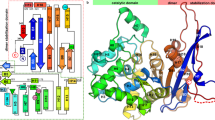Abstract
SOME L-asparaginases (L-asparagine amidohydrolase, EC 3.5.1.1) are able to destroy asparagine dependent tumours in animals and bring about regression in some cases of acute lymphatic leukaemia in man1. The anti-tumour property of this enzyme was first recognized by Broome2 with the asparaginase from guinea-pig serum and has since been observed with the enzyme from chicken liver3. Most of the clinical work, however, has been carried out with the more readily available asparaginases from bacteria. An asparaginase from Escherichia coli4, and more recently the enzyme from Erwinia carotovora5, are both being used in clinical trials on leukaemia. One interesting aspect of the clinical use of asparaginases is that not all preparations are effective against tumours. For example, the enzymes from guinea-pig liver6. Bacillus coagulans4 and yeast7 are ineffective. In fact, only one of the two asparaginases present in E. coli exhibits this property. Furthermore, those which are effective differ in their efficacy towards the 6H3HED tumour in mice which is normally used for the assessment of anti-tumour activity. Information on molecular structure may shed light on those features of the asparaginase which confer this property and suggest ways of enhancing it.
This is a preview of subscription content, access via your institution
Access options
Subscribe to this journal
Receive 51 print issues and online access
$199.00 per year
only $3.90 per issue
Buy this article
- Purchase on Springer Link
- Instant access to full article PDF
Prices may be subject to local taxes which are calculated during checkout
Similar content being viewed by others
References
Adamson, R. H., and Fabro, S., Cancer Chemother. Rep. (Part 1), 52, 617 (1968).
Broome, J. D., Nature, 191, 1114 (1961).
Ohnuma, T., Bergel, F., and Bray, R. C., Biochem. J., 103, 238 (1967).
Mashburn, L. T., and Wriston, J. C., Arch. Biochem. Biophys., 105, 450 (1964).
Wade, H. E., Elsworth, R., Herbert, D., Keppie, J., and Sargeant, K., Lancet, i, 776 (1968).
Suild, H. M., and Hubert, P. A., J. Biol. Cnem., 240, 2234 (1965).
Broome, J. D., J. Nat. Cancer Inst., 35, 967 (1965).
Whelan, H. A., and Wriston, J. C., Biochemistry, 8, 2386 (1969).
Yphantis, D. A., Biochemistry, 3, 297 (1964).
Charlwood, P. A., J. Polymer Sci., Part C, 16, 1717 (1967).
Charlwood, P. A., Canad. J. Biochem., 46, 845 (1968).
Ho, P. P. K., Frank, B. H., and Burck, P. J., Science, 165, 510 (1969).
Low, B. W., and Richards, F. M., J. Amer. Chem. Soc. 74, 1660 (1952).
Matthews, B. W., J. Mol. Biol., 33, 491 (1968).
Author information
Authors and Affiliations
Rights and permissions
About this article
Cite this article
NORTH, A., WADE, H. & CAMMACK, K. Physicochemical Studies of L-Asparaginase from Erwinia carotovora. Nature 224, 594–595 (1969). https://doi.org/10.1038/224594a0
Received:
Issue Date:
DOI: https://doi.org/10.1038/224594a0
This article is cited by
-
Kristallographische Daten einer monoklinen Modifikation derl-Asparaginase A ausEscherichia coli
Die Naturwissenschaften (1970)
Comments
By submitting a comment you agree to abide by our Terms and Community Guidelines. If you find something abusive or that does not comply with our terms or guidelines please flag it as inappropriate.



